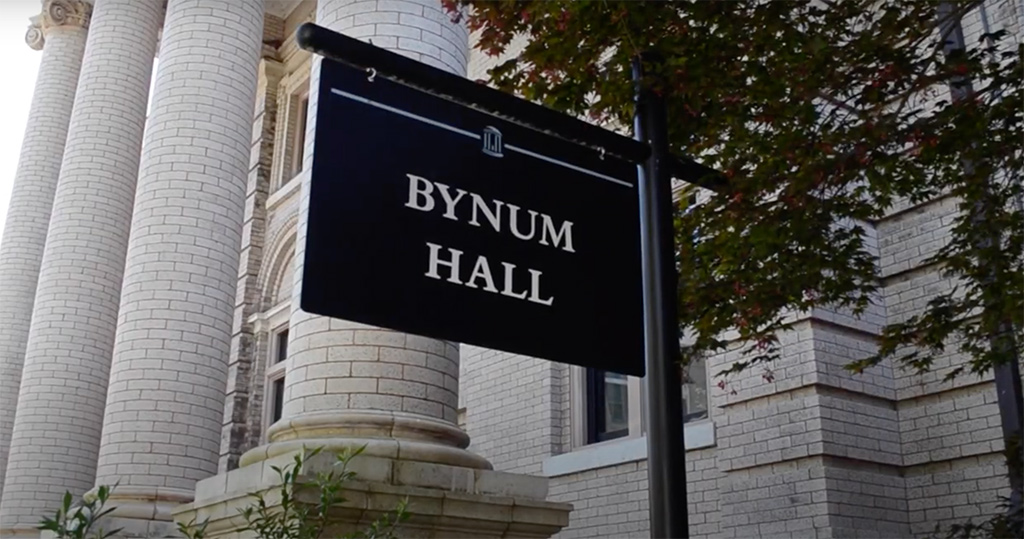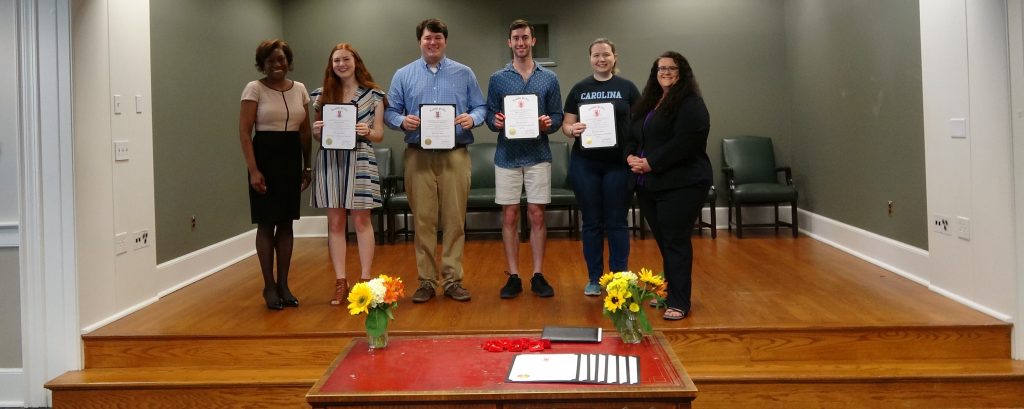About
Through teaching, research and service, the Department of Communication addresses how communication functions to create, sustain, and transform personal life, social relations, political institutions, economic organizations, and cultural and aesthetic conventions in society.

The Department of Communication develops competencies required for mediated and non-mediated communication. Overall, it develops skills for analyzing, interpreting and critiquing communication problems and questions.
The Department of Communication includes 30 faculty, 50 graduate students, and over 800 undergraduate majors. The Department and personnel are recognized for significant contributions to the profession, University, state, and nation.
The Department of Communication supports the University’s core values, encouraging diversity and equal educational and employment opportunities throughout the University community. These values are articulated in the University’s non-discrimination policy and by the office of Diversity and Multicultural Affairs.

Mission: Advance Communication for the public good.

Vision: Citizen-scholars building a better North Carolina and world.

Values: Engage. Create. Critique. Realized in an environment of diversity, respect, community, accountability, and excellence.
Communication as a field of inquiry is dedicated to understanding the various and complex processes through which human beings communicatively construct systems of meaning, institutional forms, and social realities. As a department, our guiding assumption is that Communication is a critical and creative activity in which the “everyday” objectivity of human meaning production is called into question, scrutinized, and transformed. The department enacts this activity via three principles that inform our modes of teaching, research, and service and that, articulated together, constitute the philosophical foundation of our program. The three modes of enactment are Engagement, Creativity, and Critique. These three modes, though different, must be inseparably linked if they are to embody our fundamental commitment that ideas matter in shaping the possibilities for a better world. To sustain our commitment to any one of these, all three must be supported and embraced. Moreover, it is our belief that communication is the ideal locus at which these three commitments can be enacted together.
- Engagement recognizes communication and its study as practical activities in which the act of connecting with others—individuals, texts, communities, organizations, etc.—opens up possibilities for dialogue, understanding, and social change. Our teaching, research, and service missions include a commitment to engaging other groups, discourses, and communities in ways that make a practical difference in the quality of life of UNC’s various constituencies.
Engagement is a complex and multidimensional commitment and again, it is our intention to embrace all of its possibilities, including the possibilities opened up by alliances, partnerships, different forms of outreach and collaborations. But engagement suggests more, for it implies not only political and social engagements, but also ethical ones as well. Engagement entails putting ideas into action, and allowing ideas to emerge out of and in response to action. It means embracing the belief that ideas are actions.
- Creativity recognizes communication behavior and its study as practices always constituted within a dialogue of the actualities of the past, the conditions of possibility of the present and the open–ended or indeterminate character of the future. In that sense, communication is always going beyond itself to realize new ways of acting, of relating, of being-in-the world. As such, creativity has to be brought to bear on the forms of knowledge we produce, and the ways we produce such knowledge. Creativity recognizes that there are multiple forms of knowledge.
The fundamentally creative aspect of communication is most clearly embedded in its inevitably expressive modality, which can take many aesthetic forms and engage numerous audiences, both cognitively and affectively. Whether embodied in speech, performance events, the production of visual or acoustic texts, or writing, our efforts to better understand and teach human communication processes and practices requires the ability to explore and engage with the aesthetic dimensions of these various modes of discourse.
- Critique acknowledges that our role as teachers and scholars is not merely to describe the world as it currently exists, but to explore how realities are made, why some realities hold power over others, and what consequences this has for different social groups and the health of society (or the world!) as a whole. But such critique can never merely stop at the negative, for its real purpose is to open up possibilities for alternative realities, for other ways of thinking and acting, both individually and collectively. Critique recognizes and interrogates the power and politics that underlie all forms of discursive production, including knowledge, even as it seeks a better understanding of the world in which we live. Critique recognizes that knowledge is always inseparable from the context in which it is articulated, and the subjects it engages, as producers, objects and consumers. And therefore, knowledge must always be a response to reality that accepts its own responsibility for that reality.
These commitments — our philosophy of engagement, creativity, and critique — provide the foundation for our pedagogical practice as an effort to help develop in our students and the broader citizenry a set of critical capacities that, taken together, would contribute to constituting an engaged, creative and critical 21st century citizen who participates actively in public life. After all, it is our belief that a commitment to “engagement, creativity, critique” demands a different “public” pedagogy. If skills enable you to know how to do something upon demand, something that can be identified in advance, capacities build the potential to change, to adapt to new contexts, new resources and new demands. That is, the pedagogy of capacities attempts to imbue students with a commitment to critical and creative engagement, with an openness to the new that is simultaneously an opening up of the new. Among these critical capacities are:
- An understanding of the consequences and implications of various communication choices, practices, and technologies through an awareness of the complex set of contextual relations that constitute such phenomena and their possible effects.
- An ability to analyze communication phenomena in a variety of contexts—interpersonal, rhetorical, organizational, mass-mediated—and understand the ways that such communication phenomena construct and shape human identities, social realities, and institutional forms.
- An understanding of how knowledge and theory work to enable, critique, and transform human communication behavior.
- An appreciation of the productivity of differences, even within knowledge, which would enable one to understand the multiplicity of positions on any issue without falling into relativism.
- An awareness of the complexities, contradictions and contestations of power that both shape and are shaped by the full range of communicative actions.
- An ability to translate capacities into contextually appropriate and communicatively effective skills such as: producing a staged performance; creating a documentary, narrative, or animated film; leading a group discussion; constructing a persuasive speech; conducting scholarly research; and organizing a community event.
Through our teaching, research, and service, we seek to develop and enhance the creative and critical capacities of students, citizens, and communities to engage with others in transformational ways, express themselves though various aesthetic forms, and critique the systems of knowledge and power that shape their—and our—lives. We view such capacities as vital to the development of a democratically engaged citizenry that can face the enormous challenges and problems of our 21st century global societies.
The Department of Communication is committed to producing a working environment built upon principles of community. Each person—faculty, staff, graduate students and undergraduates — is expected to enact these principles and participate in the community imagined here. Both individually and collectively, we are committed to the following:
1. A safe environment for diversity of all sorts
2. A supportive environment for a plurality of opinions, without fear of retaliation or intimidation
3. A nurturing environment, in which all members can be fully flourishing participants within the responsibilities of their positions
4. A fair environment, in which labor and responsibility are equitably distributed
5. A communal environment, in which people are willing to put their responsibility to the community above pure self-interest, and to engage with each other, intellectually and professionally
6. A transparent community, both between and among faculty, staff and students, in which people interact on the bases of trust, respect, confidentiality, self-reflexivity and accountability
7. A civil environment, in which people have the courage to state their opinions, the wisdom to accept disagreement without attributing negative motives or meanings, and the commitment to accept majority decisions
8. A responsive community that practices forgiveness
9. A community that values and fosters excellence
The Department of Communication is committed to cultivating an intellectual and social environment in which diversity, in its many forms, practices, and effects, is valued and developed.
The Department recognizes that there are historical and structural obstacles to realizing and sustaining this vision. The work of diversity, therefore, requires consistent attention and effort in order for diverse perspectives and underrepresented populations to fully contribute to and enhance the teaching, research, and governance of the Department.
The Department seeks to do more than provide equal access for everyone; through diversity work, it strives to produce democratic capacities that safeguard the value of difference.
The Department supports the University’s core values encouraging diversity and equal educational and employment opportunities throughout the University community. These values are articulated in the University’s non-discrimination policy and by the Office of Diversity and Multicultural Affairs.
